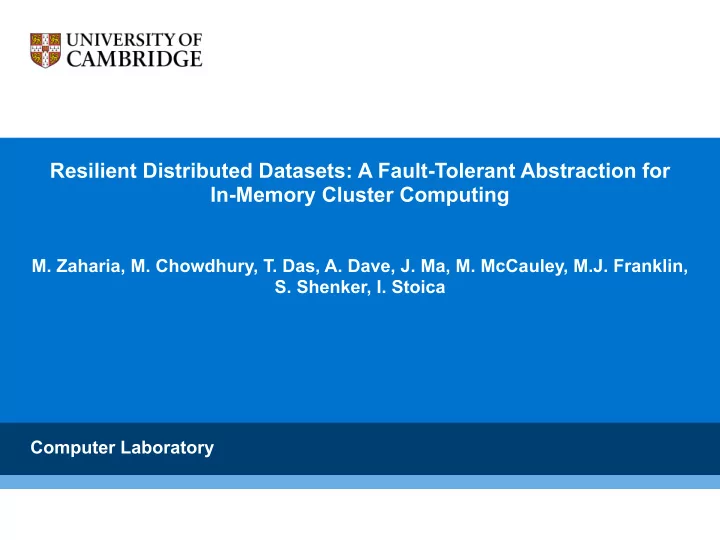

Resilient Distributed Datasets: A Fault-Tolerant Abstraction for In-Memory Cluster Computing M. Zaharia, M. Chowdhury, T. Das, A. Dave, J. Ma, M. McCauley, M.J. Franklin, S. Shenker, I. Stoica Computer Laboratory
Principal Motivation • MapReduce/Dryad built around acyclic flow of data • Inefficient at handling iterative computation & data reuse • Machine Learning Algorithms • Interactive data mining tools • Propose a solution for a class of applications that require • Working sets of data • scalability and fault tolerance 2
Resilient Distributed Datasets Key Idea • Leverage distributed memory • Improve upon specialised frameworks e.g. Haloop, Pregel, etc. What are RDDs? • Read-only collection objects • Partitioned across several nodes • Reconstructible incase of node failure • Enables in-memory computation � � 3
Resilient Distributed Datasets Representation of RDDs • set of partitions • set of dependencies — lineage • function to compute RDD from parent RDDs • metadata on partitioning scheme & data placement Lineage • Recompute elements of a partition • Iterate over parent partitions; use the function in RDD 4
RDDs: Types of Dependencies Narrow Dependencies • One-to-one mapping of partitions between parent & child • Pipelined execution on cluster nodes • Involve map operation Wide Dependencies • Many-to-one mapping between parent & child • Require data from all parent partitions and shuffle-like operation • Involve join operation � � 5
Resilient Distributed Datasets Key Differences 1 � Aspect RDDs Dist. Shared Mem. Reads Coarse or fine grained Fine-grained Writes Coarse-grained; Fine-grained immutable consistency Behaviour if not Similar to existing data Poor performance enough RAM flow systems Fault Recovery Fine grained & low- Requires checkpoints overhead using lineage & rollbacks 6
Resilient Distributed Datasets Computational Factors • Cost of storage • Disk I/O overhead • Probability of node failure • Cost of recomputing a partition Limitations • Inefficient for asynchronous fine-grained updates • E.g. incremental web crawler, storage system for a webApp,etc. 7
Spark: Cluster Computing Framework Introduction • Implemented in Scala • Built on top of Mesos (cluster operating system) • Enables resource sharing with Hadoop MPI • RDD implementation • HDFS file objects • partition-to-block size mapping 8
Spark: RDD representation Types of RDD constructs • File in a shared file system e.g. HDFS • Scala collection object e.g. an array • Transforming an existing RDD using flatMap() • Change persistence of an existing RDD • Cache action: dataset is kept in memory • Save action: dataset is written to the file system 9
Spark: Dataflow • Driver program implements control flow • Parallel programming abstractions • RDDs • parallel operations • Types of parallel operations • reduce • collect • foreach 10
Spark: Dataflow Job Scheduling • RDD lineage graph examined • DAG of stages is built • Characteristics of a stage • as many narrow dependencies • Wide dependencies require shuffle operation • Tasks assigned on data locality 11
Spark: Limitations • Scheduler failures not tolerated • re-run the task till stage’s parents available • else, replicate RDD lineage graph to compute partition • Checkpointing API application/user dependent • Replicate Flag to persist 12
Spark: Assessment Datasets • User written applications • ML algorithms: K-means & logistical regression • 1 TB dataset for interactive queries Benchmarks • Hadoop: 0.20.2 stable release • HadoopBinMem • converts input data to binary format • reduces over-head 13
Spark: Assessment ML Algorithms • Spark outperforms hadoop by 20x • Avoided repeated I/O and deserialisation cost Interactive query dataset • Spark performed with the response time of 5.5-7s • Dependent on the page rank implementation User Applications • Analytics report execution improved by 40x • Other apps scale and perform well � 14
RDDs: Conclusion • Showed better performance • Express cluster programming models • Capture optimisations • keeping specific data in-memory • partitioning to minimize communication • recover from failures efficiently • Promising paradigm in cluster computing 15
Recommend
More recommend